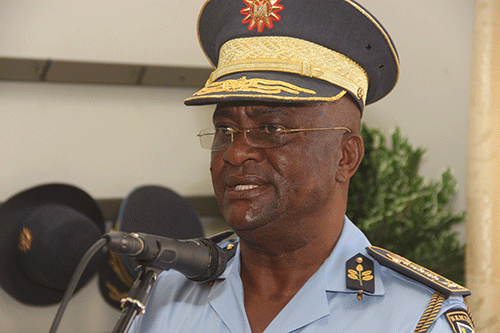Critically analysing the key statement issued on the occasion of the official opening of the Chiefs Forum Meeting on 27 June, one would draw a reasonable inference that if the current negotiations are not overhauled, they will leave us with cancerous sores in our throats for generations to come.
Surprisingly, the negotiations between Germany and the Namibian government on the 1904-1908 genocide of Ovaherero and Nama people, which have outstretched
a reasonable period (now nearly a decade), were seemingly conducted without a firm commitment of or to the affected communities.
There have been no real in-depth give-and-take considerations, thus giving the glaring impression of a very poor approach to what should be an honest and unconditional acknowledgement
or recognition of the genocide, a genuine apology, and an appropriate quantum for reparations. In essence, the impression has been created by those involved: “Let us see what we can get out of this deal.”
With this kind of approach, one is unlikely to get true value from a vantage point because chances are your counterpart is well-prepared with decades of experience in their Holocaust reparations to the Jewish community—in Germany and in the diaspora—since 1952. With the half-hearted approach, the negotiations will likely be a
“friendly exchange over a light lunch” about the last sports weekend. It will be a directionless “business discussion” with meagre results for Namibia, especially for the genuinely-affected communities that continue to suffer the pain.
Flaws
Essentially, before getting started, the Namibian government, as a mediator, should have been mandated by the affected communities with acclaim. Thereby, mediating from a clearly- defined position of what the affected communities want to achieve, and prioritising their needs and wishes in intense negotiations. Unfortunately, the parties on both sides of the negotiation table have been mostly haggling over the quantum amount the German government initially proposed. This only serves the interests of the guilty party, who has waived their apology, and
has no interest in paying
appropriate reparations.
This has resulted in negotiations swaying arrhythmically backwards and forwards, and from side to side. But in a dramatic turn of events, a Joint Declaration (JD) was initiated, and, in no time, the addenda of amendments were surreptitiously attached thereto.
Similarly, critical issues, including acknowledgement of “genocide” -affected communities in the diaspora, the inadequacy of the quantum amount, the period (30 years) of disbursement of funds, the atonement of guilt, and Grant vs. Reparation, have recently been reconfigured and added to the wish list. This leaves a great deal to be desired, and one wonders whether the
Namibian team has a clear-cut vision and roadmap.
It is also imperative to highlight one resolution out of the four principles outlined in the motion of the Namibian National Assembly on the 26th of September 2006, which were unanimously adopted, but for known reasons, one was not followed through.
(3) “That the Namibian government should be an interested party in any discussions between its nationals and the German government on the issue of reparations.” This is an elephant in the room that must be addressed immediately, as the affected
communities feel left out in the negotiations, and, the prospects of further negotiations for successful outcomes appear diminished.
Diaspora
According to the latest versions of the agreement between Germany and Namibia, the affected communities in the diaspora who choose not to return to Namibia will only benefit from the “Reconciliation Programme” while in their countries of domicile. What is this “reconciliation programme”? Ironically, those affected communities have not been genuinely represented in ongoing negotiations. What mechanisms are now in place for them to benefit from a possible agreement? How have their needs been assessed? What is their budget proposal for the reparation programme?
Quantum
According to the latest versions of the agreement between Germany and Namibia, apparently, funding will be made available for the implementation of the Reconstruction and
Reconciliation Programme for the affected communities after the quantum amount is exhausted.
Is there an agreement? What is the plan, and what does it entail? In fact, by only agreeing to the initial amount at this stage leaves
the communities vulnerable in the future.
Disbursement of funds: Germany also “agreed” to front-load the disbursement of funds to shorten the disbursement over a 30-year period. What is in the text of the financing agreement? What is the execution plan?
How will the money be invested during the programme’s implementation?
Manoeuvre
Some negotiators resort to intransigence, obstinacy and unethical behaviour to try to get the upper hand
in a negotiation. By doing so, they convey the message that they view negotiation as a win-lose enterprise. A keen observer can only conclude this has been Germany’s attitude during the ongoing negotiations, starting with
their reluctance to accept and use the term “genocide.” This spells disaster for the Namibians, who will be short-changed.
In closing, it is rather imperative for the Head of State to appoint an acceptable and esteemed Special Envoy to the ongoing negotiations. At this point, the talks are basically directionless.
Sarcastically, the “genocide deal” has now been upgraded to vague amounts in financial support for Namibia, with Germany still resisting that genocide funds should not be labelled as “reparations”. Advisably, Namibia can tap into the international community’s expertise to assist in this arduous task.
Regrettably, some traditional chiefs of the affected communities have boycotted the talks, and they have now been joined by those who earlier sided with the Namibian government’s approach in this connection, such that those communities are, however, not fully represented there.
The government must lend an ear to those traditional leaders on the principle of “Audi Alteram Partem”. In addition, the idea of a “national consultative conference” being touted by some of the traditional leaders outside the talks, emanating from flaws in the current negotiations, may be ideal for consideration.
Otherwise, the patriotic world will be gazing at us in disbelief.
*Major general (retired) JB Tjivikua is a descendant of victims of 1904-1908 genocide.


